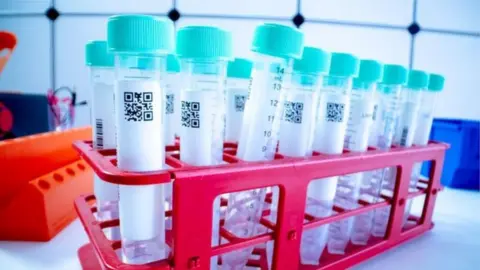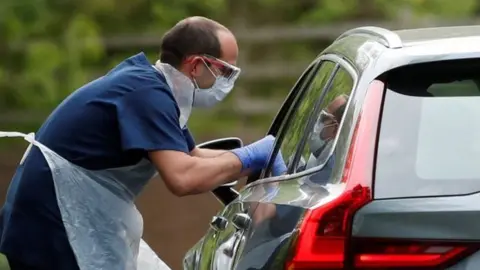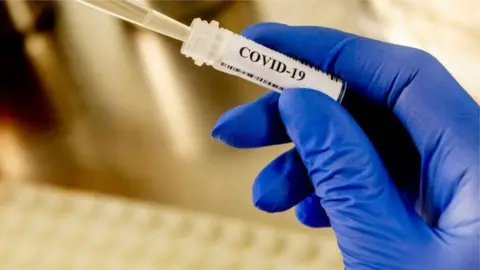Coronavirus testing: New 'risk-based' strategy in Wales
 Getty Images
Getty ImagesA new "risk-based" coronavirus testing strategy will be put in place in Wales, says Health Minister Vaughan Gething.
The number of positive tests being recorded has now dropped to about 1%, which is "very good news", said Mr Gething.
But he said it meant wholesale testing of entire sectors may no longer be appropriate.
He said care home staff will be offered weekly tests for the next four weeks, but then dropping to fortnightly tests.
Mr Gething told the Welsh Government's daily coronavirus briefing the new strategy set out "why, where and how we will test to achieve clear outcomes".
He said priorities would be:
- Protecting the NHS "to keep our staff and patients safe"
- Contact tracing "to prevent the spread of the virus"
- Protecting vulnerable groups - "those at greatest risk"
- Future delivery, using new technologies "to improve our understanding of the virus"
He said: "An enormous amount has been achieved over the past few months and I would like to thank everyone for their contribution.
"But, we now need to prepare ourselves for this next phase - and for what might be a difficult winter."
The health minister said the low prevalence of positive tests in the residential care sector now posed other challenges, including increases in false results being returned.
 Reuters
ReutersHe told Wednesday's briefing that was one of the reasons why antigen testing, which shows if someone has Covid-19, would become fortnightly rather than weekly in care homes later in August.
He said that where care homes are identified as higher risk, for example due to local outbreaks, "bespoke testing regimes" would be implemented.
In his latest statement setting out the new strategy he added: "We now have a national testing infrastructure that means anyone who needs a test can access one.
"This enables our contact tracing system to help control the transmission of the disease as lockdown measures are eased."
He told the briefing: "This risk-based approach will also apply to other settings and localities, enabling local teams to use testing as part of a wider approach to surveillance and outbreak control."
 Getty Images
Getty ImagesBut the health minister said he recognised more still needed to be done on turning around test results.
Last week, only 66.3% of results came back within 48 hours, the worst performance since the crisis began.
A single laboratory was blamed for "difficulties" in returning results.
"There are still areas where we know we need to improve and we are working hard to ensure more test results are returned within 24 hours," said Mr Gething.
"Over the weeks and months ahead, we'll make the most of new testing technologies and be ready to seize the opportunities that these offer."
Plaid Cymru health spokesman Rhun ap Iorwerth said "talk of a reduction in weekly to fortnightly testing of care home staff at a point that more restrictions are eased is going to be a concern to many".
"I feel strongly that we need to make better use of the testing capacity available, and we need to make sure that those care workers most at risk - either in terms of their own health or the health of others they come into contact with - are tested regularly."
